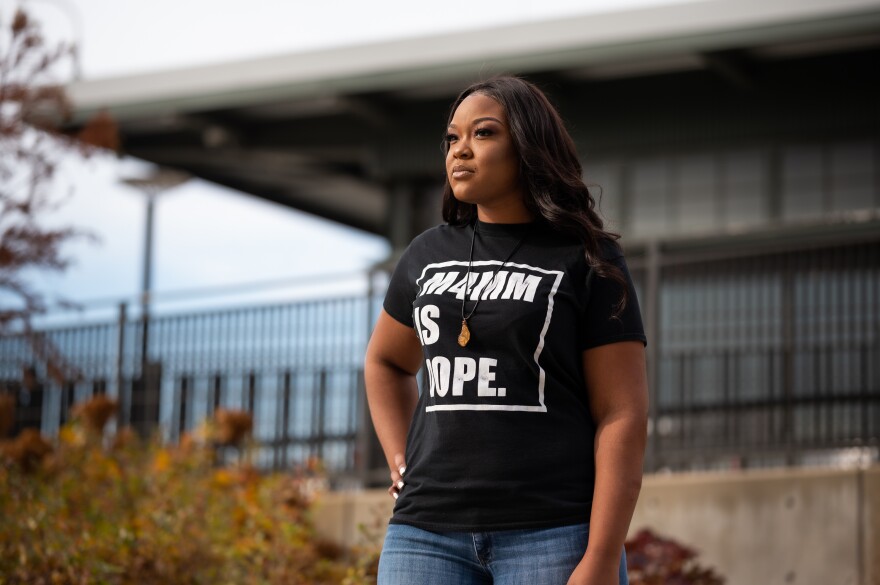Medical marijuana dispensaries are starting to open across Missouri, but some activists say there's a big problem — a lack of racial diversity.
Marne Madison, Missouri chapter president of Minorities for Medical Marijuana, takes issue with the fact that most dispensary owners are white, even at locations planning to open in predominantly Black communities.
She said people of color in urban communities like St. Louis weren’t given enough resources to get involved in the new industry.
“I was a little taken back by the picture of the first official sale of cannabis in Missouri, and there were three white people in the picture … where was that representation?” she said. “When we talk about ownership, we talk about a lack of proper implementation of things that we can use to help minorities, specifically Black people, to actually get in.”
Madison recently started Fleur Verte Academy, which aims to help Black people start ancillary cannabis businesses, learn to grow cannabis at home or become a caregiver — someone who is allowed to grow cannabis on behalf of patients with a medical marijuana card.
St. Louis Public Radio’s Corinne Ruff spoke with Madison about the barriers facing Black entrepreneurs in the cannabis industry and what dispensaries could do to help people of color.
This interview was edited and condensed for clarity.
Corinne Ruff: Your organization Minorities for Medical Marijuana advocated for more minority representation in the licensing process — you held boot camps last year to try to help people prepare their applications — but as dispensaries start to open their doors in Missouri, how diverse does it actually look?
Marne Madison: It's not looking diverse at all.
We're even talking about our Hispanic origins, our Asian communities. So even going into those communities and hearing different ethnic groups of people say that they feel as though they have been let down, they feel disenfranchised. And to relate that to a market where there are more minorities in prison for this has caused me to continue to create opportunities for the minority community in cannabis.
Ruff: In the St. Louis region, some of these dispensaries will open in predominantly underserved communities of color. What do they need to do to build trust in those communities?
Madison: Our communities need so much beyond the sale of cannabis. So when we talk about why cannabis is in the community, we talk about mental health, the lack of resources, job opportunities. So creating things around that to get the community's attention, and then restoring the trust that way, I think it would be a great way to start.
Hosting food drives would be amazing, donating books to the community for their children would be great, start there. But to see a whole year go by, you've won a license, you know exactly your location, and to not show up and even knock on doors and say hi, is a problem.
Ruff: Looking at the numbers nationwide, less than 5% of licensed cannabis companies are Black owned and operated. So there are a lot of barriers to entry in this space. As a Black woman who did apply for a license, what were the barriers that you experienced?
Madison: For myself, there were a lot of hardships. Fortunately, the investment part wasn’t hard because I won the first cannabis pitch investment competition here in Missouri. So it allowed me to break down barriers that other people saw as the end of end.
I do believe proper experience and professional experience keeps us out of the market. You're asking for people who have been working in a black market for years to find someone who has a, you know, biology or chemistry background, a pharmacist or a doctor of pharmacology — all of these things that the average Black person may not have in-house, but we have been the person selling this plant for you know, this amount of years.
Ruff: How can entrepreneurs of color get involved in Missouri's industry now?
Madison: Now is the time for Blacks to emerge in cannabis. And we're definitely here to help at Fleur Verte Academy. We have business development consultations. So far, we have helped over 10 small Black-owned businesses turn into cannabis ancillary businesses, from private infused dinners to those soap creators — the list is endless.
Ruff: What do you want communities of color, specifically Black communities, to know about this new industry?
Madison: I want them to know that for one, it is definitely possible to get in and to win. There will be a lot of people who won't see your vision, but that's OK because cannabis, everyone is their own brand. There is no right or wrong way to do this. There's just a legal compliance way. So definitely please make sure that you understand the law inside of the different markets that you live in. But other than that, go for it.
Follow Corinne on Twitter: @corinnesusan
Send questions and comments about this story to feedback@stlpublicradio.org





